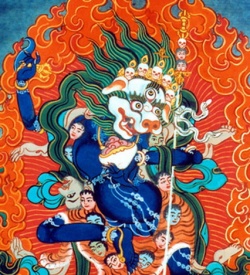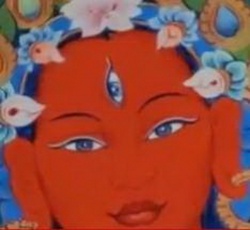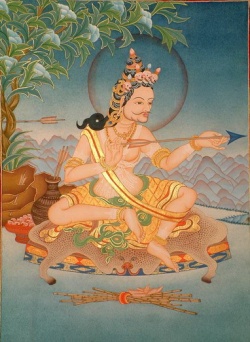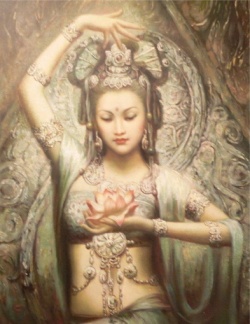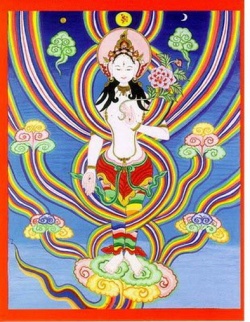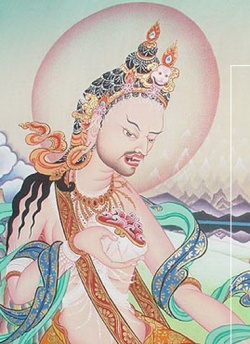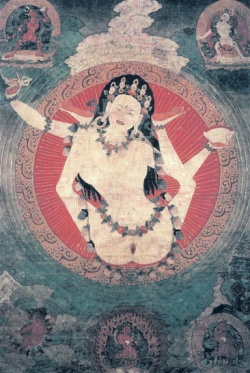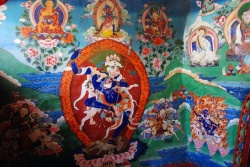Difference between revisions of "The Heart Sutra"
| (7 intermediate revisions by 3 users not shown) | |||
| Line 1: | Line 1: | ||
[[File:0014.jpg|thumb|250px|]] | [[File:0014.jpg|thumb|250px|]] | ||
| + | |||
| + | |||
| + | |||
| + | |||
| + | |||
[[Heart Sutra]]; [[Prajnaparamitahrdayasutra]] (Skt); [[shes rab snying po ’i mdo]] (Tib). One of the most important of the [[Mahayana sutras]]. The [[principal]] [[subject]] [[matter]] is [[emptiness]] of [[self]] and all [[phenomena]]. It is recited regularly in [[Tibetan]] [[monasteries]]. | [[Heart Sutra]]; [[Prajnaparamitahrdayasutra]] (Skt); [[shes rab snying po ’i mdo]] (Tib). One of the most important of the [[Mahayana sutras]]. The [[principal]] [[subject]] [[matter]] is [[emptiness]] of [[self]] and all [[phenomena]]. It is recited regularly in [[Tibetan]] [[monasteries]]. | ||
| Line 5: | Line 10: | ||
| − | [[Sariputra]], all [[dharmas]] are marked with [[emptiness]]. They do not appear or disappear, are not [[tainted]] or [[pure]], do not increase or {{Wiki|decrease}}. Therefore, in [[emptiness]] no [[form]], no [[feelings]], [[perceptions]], impulses, [[consciousness]]. No {{Wiki|eyes}}, no {{Wiki|ears}}, no {{Wiki|nose}}, no {{Wiki|tongue}}, no [[body]], no [[mind]], no {{Wiki|color}}, no [[sound]], no {{Wiki|smell}}, no {{Wiki|taste}}, no {{Wiki|touch}}, no {{Wiki|object}} of [[mind]], no [[realm]] of {{Wiki|eyes}}, and so forth until no [[realm]] of [[mind]] [[consciousness]]. No [[ignorance]] and also no [[extinction]] of it, and so forth until no [[old age]] and [[death]] and also no [[extinction]] of them. No [[suffering]], no origination, no | + | [[Sariputra]], all [[dharmas]] are marked with [[emptiness]]. They do not appear or disappear, are not [[tainted]] or [[pure]], do not increase or {{Wiki|decrease}}. Therefore, in [[emptiness]] no [[form]], no [[feelings]], [[perceptions]], {{Wiki|impulses}}, [[consciousness]]. No {{Wiki|eyes}}, no {{Wiki|ears}}, no {{Wiki|nose}}, no {{Wiki|tongue}}, no [[body]], no [[mind]], no {{Wiki|color}}, no [[sound]], no {{Wiki|smell}}, no {{Wiki|taste}}, no {{Wiki|touch}}, no {{Wiki|object}} of [[mind]], no [[realm]] of {{Wiki|eyes}}, and so forth until no [[realm]] of [[mind]] [[consciousness]]. No [[ignorance]] and also no [[extinction]] of it, and so forth until no [[old age]] and [[death]] and also no [[extinction]] of them. No [[suffering]], no origination, no stopping, no [[path]], no {{Wiki|cognition}}, also no [[attainment]] with [[nothing]] to attain. |
| − | Because there is [[nothing]] obtainable, [[bodhisattvas]] through the reliance on [[prajna-paramita]] have no [[attachment]] and [[hindrance]] in their [[minds]]. Because there is no more {{Wiki|attachment}} and [[hindrance]], there is no more {{Wiki|fear}}, and far away from erroneous [[views]] and wishful [[thinking]]; ultimately: the final [[nirvana]]. [[Buddhas]] of the {{Wiki|past}}, {{Wiki|present}}, and {{Wiki|future}} all rely on [[prajna-paramita]] to attain [[annutara-samyak-sambodhi]] (Consummation of Incomparable [[Enlightenment]]). | + | Because there is [[nothing]] obtainable, [[bodhisattvas]] through the reliance on [[prajna-paramita]] have no [[attachment]] and [[hindrance]] in their [[minds]]. Because there is no more {{Wiki|attachment}} and [[hindrance]], there is no more {{Wiki|fear}}, and far away from erroneous [[views]] and wishful [[thinking]]; ultimately: the final [[nirvana]]. [[Buddhas]] of the {{Wiki|past}}, {{Wiki|present}}, and {{Wiki|future}} all rely on [[prajna-paramita]] to attain [[annutara-samyak-sambodhi]] (Consummation of {{Wiki|Incomparable}} [[Enlightenment]]). |
| − | Therefore, realize that [[prajna-paramita]] is the great wondrous [[mantra]], the great radiant [[mantra]], the [[unsurpassed]] [[mantra]], and the unequalled [[mantra]]. It can eradicate all [[suffering]], and it is genuine and not false. Therefore, utter the [[prajna-paramita]] [[mantra]]--[[Chant]]: '''Gate Gate Paragate Parasmagate Bodhisvaha''' (gone gone totally gone totally completely gone [[enlightened]] so be it). | + | Therefore, realize that [[prajna-paramita]] is the great wondrous [[mantra]], the great radiant [[mantra]], the [[unsurpassed]] [[mantra]], and the unequalled [[mantra]]. It can eradicate all [[suffering]], and it is genuine and not false. Therefore, utter the [[prajna-paramita]] [[mantra]]--[[Chant]]: '''Gate Gate [[Paragate]] Parasmagate Bodhisvaha''' (gone gone totally gone totally completely gone [[enlightened]] so be it). |
-----------------------------------------------------------------<br/><br/> | -----------------------------------------------------------------<br/><br/> | ||
[[File:Ges976789.jpg|thumb|250px|]] | [[File:Ges976789.jpg|thumb|250px|]] | ||
English Title: The [[Sutra]] of the Lady, the [[Heart]] of [[Transcendental]] [[Wisdom]] | English Title: The [[Sutra]] of the Lady, the [[Heart]] of [[Transcendental]] [[Wisdom]] | ||
[[Sanskrit]] Title: [[Bhagavati Prajna-paramita Hridaya Sutra]]. | [[Sanskrit]] Title: [[Bhagavati Prajna-paramita Hridaya Sutra]]. | ||
| − | [[Tibetan]] title: bCom-ldan-'das-ma | + | [[Tibetan]] title: [[bCom-ldan-'das-ma Shes-rab kyi P'a-rol-tu P'yin-pai sNying-po zhes-bya-ba bzhugs-so]] |
Homage to the blessed lady, {{Wiki|holy}} [[transcendental]] [[wisdom]]! | Homage to the blessed lady, {{Wiki|holy}} [[transcendental]] [[wisdom]]! | ||
| Line 24: | Line 29: | ||
evam [[maya]] srutam [[ekasmin samaye]], [[bhagavan]] rajagrhe viharati sma grdhra-kuta-parvate, mahata bhiksu-samghena sardham mahata ca bodhisattva-samghena. | evam [[maya]] srutam [[ekasmin samaye]], [[bhagavan]] rajagrhe viharati sma grdhra-kuta-parvate, mahata bhiksu-samghena sardham mahata ca bodhisattva-samghena. | ||
| − | Di skad [[bdag]] gis thon pa dus gcig na, bcom-ldan-'das rgyal-poi [[khab]] bya rgod phung-poi ri la, dge-slong gi dge-'dun [[chen-po]] dang [[byang-chub]] sems-dpai dge-'dun [[chen-po]] dang thabsgcig tu bzhugs-te | + | Di skad [[bdag]] gis thon pa dus gcig na, bcom-ldan-'das rgyal-poi [[khab]] bya rgod phung-poi ri la, [[dge-slong]] gi [[dge-'dun]] [[chen-po]] dang [[byang-chub]] sems-dpai [[dge-'dun]] [[chen-po]] dang thabsgcig tu bzhugs-te |
| Line 31: | Line 36: | ||
tena khalu punah samayena [[bhagavan]] gambhira-avabhasam [[nama]] dharmaparyayam bhasitva samadhim samapannah. | tena khalu punah samayena [[bhagavan]] gambhira-avabhasam [[nama]] dharmaparyayam bhasitva samadhim samapannah. | ||
| − | De'i tshe bcoin-Idan-'das zab-mo [[snang-ba]] zhes-bya-ba'i choskyi [[rnam]] [[grangs]] kyi ting-de-'dzin la snyoms par zhugs-pa-so | + | De'i [[tshe]] bcoin-Idan-'das zab-mo [[snang-ba]] zhes-bya-ba'i choskyi [[rnam]] [[grangs]] kyi ting-de-'dzin la snyoms par zhugs-pa-so |
[[File:Tilopa4.jpg|thumb|250px|]] | [[File:Tilopa4.jpg|thumb|250px|]] | ||
| − | 3. And in a coinciding [[time]], {{Wiki|holy}} [[Avalokitesvara]] the [[mahasattva]]-[[bodhisattva]], was engaged in observing the practice of [[transcendental]] [[wisdom]], wherein the [[actuality]] of the five complexes are observed as [[empty]]. | + | 3. And in a coinciding [[time]], {{Wiki|holy}} [[Avalokitesvara]] the [[mahasattva]]-[[bodhisattva]], was engaged in observing the practice of [[transcendental]] [[wisdom]], wherein the [[actuality]] of the [[five complexes]] are observed as [[empty]]. |
tena ca samayena arya-avalokitesvaro bodhisattvo mahasattvo gambhirayam prajnaparamitayam caryam caramana evam vyavalokayati sma: panca-skandhas | tena ca samayena arya-avalokitesvaro bodhisattvo mahasattvo gambhirayam prajnaparamitayam caryam caramana evam vyavalokayati sma: panca-skandhas | ||
tams ca svabhava-sunyan vyavalokayati. | tams ca svabhava-sunyan vyavalokayati. | ||
| − | Yang de'i tshe [[byang-chub sems-dpa']] sems-dpa' [[chen-po]] '[[phags-pa]] spyan-ras-gzigs dbang-pyug [[shes-rab]] kyi p'a-rol tu p'yin-pa zab-moi [[spyod-pa]] nyid la rnam-par blta zhingphungpo lnga po de dag la yang [[rang bzhin]] gyi stong-par rnam-par blta'o | + | [[Yang]] de'i [[tshe]] [[byang-chub sems-dpa']] sems-dpa' [[chen-po]] '[[phags-pa]] spyan-ras-gzigs dbang-pyug [[shes-rab]] kyi p'a-rol tu p'yin-pa zab-moi [[spyod-pa]] [[nyid]] la rnam-par blta zhingphungpo [[lnga]] po de dag la [[yang]] [[rang bzhin]] gyi stong-par rnam-par blta'o |
| Line 46: | Line 51: | ||
atha ayusmanc sariputro buddha-anubhavena arya-Avalokitesvaram bodhisattvam mahasattvam etad avocat | atha ayusmanc sariputro buddha-anubhavena arya-Avalokitesvaram bodhisattvam mahasattvam etad avocat | ||
| − | De nas [[sangs-rgyas]] kyi mthus tshe dang Idan-pa sh'a ri'i bus [[byang-chub sems-dpa']] sems-dpa' [[chen-po]] '[[phags-pa]] spyanras gzigs dbang-p'yug la 'di skad ces smras-so | + | De nas [[sangs-rgyas]] kyi mthus [[tshe]] dang Idan-pa sh'a ri'i bus [[byang-chub sems-dpa']] sems-dpa' [[chen-po]] '[[phags-pa]] spyanras gzigs dbang-p'yug la 'di skad ces smras-so |
5. "How should a son or daughter of [[noble]] [[lineage]], who wishes to practice the profound [[transcendental]] [[wisdom]], train themselves" | 5. "How should a son or daughter of [[noble]] [[lineage]], who wishes to practice the profound [[transcendental]] [[wisdom]], train themselves" | ||
| − | yah kascit kulaputro va kuladuhita va asyam ganubhirayam prajnaparamitayam caryam cartukamas tena katham siksitavyam? | + | yah kascit kulaputro va kuladuhita va asyam ganubhirayam prajnaparamitayam caryam cartukamas tena [[katham]] siksitavyam? |
[[File:WomensDakini.jpg|thumb|250px|]] | [[File:WomensDakini.jpg|thumb|250px|]] | ||
| − | Rigs kyi bu'ma rigs kyi bu-mo gang la la [[shes-rab]] kyi pha-rol tu p'yin-pa zab moi [[spyod-pa]] spyad-par 'dod-pa des ji ltar bslab par bya | + | [[Rigs]] kyi bu'ma [[rigs]] kyi bu-mo gang la la [[shes-rab]] kyi pha-rol tu p'yin-pa zab moi [[spyod-pa]] spyad-par '[[dod-pa]] des ji ltar bslab par bya |
| Line 60: | Line 65: | ||
evam ukta arya-avalokitesvaro bodhisattvo mahasattvo ayusmantam sariputram etad avocat | evam ukta arya-avalokitesvaro bodhisattvo mahasattvo ayusmantam sariputram etad avocat | ||
| − | De skad ces smras-pa dang, [[byang-chub sems-dpa']] sems-dpa' [[chen-po]] '[[phags-pa]] sphyan-ras-gzigs dbang-p'yuig gis tshe dang Idan-pa sha' ra dwa-ti'i bu la 'di skad ces smras-so | + | De skad ces smras-pa dang, [[byang-chub sems-dpa']] sems-dpa' [[chen-po]] '[[phags-pa]] sphyan-ras-gzigs dbang-p'yuig gis [[tshe]] dang Idan-pa sha' ra dwa-ti'i bu la 'di skad ces smras-so |
| Line 67: | Line 72: | ||
yah kascic [[sariputra]] kulaputro va kuladuhita va asyam gambhirayam prajnaparamitayam caryam cartukamas tenaivam vyavalokitavyam. | yah kascic [[sariputra]] kulaputro va kuladuhita va asyam gambhirayam prajnaparamitayam caryam cartukamas tenaivam vyavalokitavyam. | ||
| − | Sha'-ri-bu rigs kyi bu'ma rigs kyi bu-mo gang la la [[shes-rab]] kyi p'a-rol tu p'yin-pa zab-moi spyad-pa spyod-par 'dod-pa des 'di ltar rnam-par blta bar-bya-ste | + | Sha'-ri-bu [[rigs]] kyi bu'ma [[rigs]] kyi bu-mo gang la la [[shes-rab]] kyi p'a-rol tu p'yin-pa zab-moi spyad-pa spyod-par '[[dod-pa]] des 'di ltar rnam-par blta bar-bya-ste |
| − | 8. The five complexes should be viewed as [[empty]] in [[actuality]]. | + | 8. The [[five complexes]] should be viewed as [[empty]] in [[actuality]]. |
[[File:WisdomDakini.jpg|thumb|250px|]] | [[File:WisdomDakini.jpg|thumb|250px|]] | ||
panca-skandhas samanupasyati ca svabhava-sunyan pasyati sma. | panca-skandhas samanupasyati ca svabhava-sunyan pasyati sma. | ||
| − | Phung-po lnga po de dag [[kyang]] [[rang-bzhin]] gyis sTong-par yang-dag par rjes su blta'o | + | [[Phung-po]] [[lnga]] po de dag [[kyang]] [[rang-bzhin]] gyis sTong-par yang-dag par rjes su blta'o |
| − | 9. "[Here [[shariputra]] | + | 9. "[Here [[shariputra]]): [[form]] is [[empty]], [[emptiness]] is [[form]];" |
| − | [iha [[sariputra]] | + | [iha [[sariputra]]): rupam [[sunyam]] sunyataiva rupam, |
gZugs sTong-pa'o. sTong-pa-nyid gZugs-so | gZugs sTong-pa'o. sTong-pa-nyid gZugs-so | ||
| Line 88: | Line 93: | ||
rupam na prthak [[sunyata]] sunyataya na prthag rupam, | rupam na prthak [[sunyata]] sunyataya na prthag rupam, | ||
| − | gZugs las [[kyang]] sTong-pa-nyid gzhan-ma-yin, sTong-panyid las [[kyang]] [[gzugs]] [[gzhan]] ma yin no | + | gZugs las [[kyang]] sTong-pa-nyid gzhan-ma-yin, sTong-panyid las [[kyang]] [[gzugs]] [[gzhan]] ma [[yin]] no |
| Line 95: | Line 100: | ||
evam eva vedana-samjna-samskara-vijnana sunyani. | evam eva vedana-samjna-samskara-vijnana sunyani. | ||
[[File:Tilopa32.jpg|thumb|250px|]] | [[File:Tilopa32.jpg|thumb|250px|]] | ||
| − | De bzhin du [[tshor-ba]] dang 'du -shes dang [['du-byed]] dang [[rnam-par-shes-pa]] rnams sTong-pa'o | + | De bzhin du [[tshor-ba]] dang 'du -shes dang [['du-byed]] dang [[rnam-par-shes-pa]] [[rnams]] sTong-pa'o |
12. "Here, [[shariputra]]: all [[phenomena]] are [[emptiness]], without {{Wiki|characteristics}}, not originated nor terminating, not [[impure]] nor immaculate, not deficient nor complete." | 12. "Here, [[shariputra]]: all [[phenomena]] are [[emptiness]], without {{Wiki|characteristics}}, not originated nor terminating, not [[impure]] nor immaculate, not deficient nor complete." | ||
| − | iha [[sariputra]]: sarva-dharmah sunyata-alaksana, anutpanna [[aniruddha]], [[amala]] avimala, anuna aparipurnah. | + | iha [[sariputra]]: sarva-dharmah sunyata-alaksana, [[anutpanna]] [[aniruddha]], [[amala]] avimala, anuna aparipurnah. |
Sha-ri'-bu de [[Ita]] bas na [[chos]] thams-cad sTong-pa-nyid de, | Sha-ri'-bu de [[Ita]] bas na [[chos]] thams-cad sTong-pa-nyid de, | ||
| Line 106: | Line 111: | ||
| − | 13. "Therefore, [[shariputra]]: in [[emptiness]] is no [[form]], no [[feeling]], no [[thought]], no [[volition]], no [[consciousness]]; no [[eye]], no {{Wiki|ear}}, no {{Wiki|nose}}, no {{Wiki|tongue}}, no [[body]], no brain-system; no | + | 13. "Therefore, [[shariputra]]: in [[emptiness]] is no [[form]], no [[feeling]], no [[thought]], no [[volition]], no [[consciousness]]; no [[eye]], no {{Wiki|ear}}, no {{Wiki|nose}}, no {{Wiki|tongue}}, no [[body]], no brain-system; no ([[visible]]- [[form]], no [[sound]], no {{Wiki|odour}}, no taste-object, no tangible-object, no ([[mental]]-] [[phenomena]]; no [[eye]] [[element]]... No {{Wiki|brain}} [[element]]... Up to, no [[mental]]-[[consciousness]] [[element]]; no [[ignorance]], no [[extinction]] of [[ignorance]]... no [[decay]] and [[death]], no [[extinction]] of [[decay]] and [[death]]; no [[suffering]], no origination [of [[suffering]]), no [[cessation]] [of [[suffering]]), no [[path]] [to the [[cessation]] of [[suffering]]); no [[knowledge]], no acquisition [of [[knowledge]]), and no non-acquisition [of [[knowledge]])." |
| − | tasmat tarhi [[sariputra]] sunyatayam na rupam na [[vedana]] na [[samjna]] na samskarah na vijnanam; na caksuh-srotra-ghrana-jihva-kaya-manamsi; na rupa-sabda-gandha-rasa-sprastavya-dharmah; na caksur-dhatur na manodhatu na manovijnana-dhatuh yavan; na [[avidya]] na-avidya-ksayo yavan na jara-maranam na jara-marana-ksayo; na duhkha-samudaya-nirodha-marga; na jnanam, na praptir na-apraptih. | + | tasmat tarhi [[sariputra]] sunyatayam na rupam na [[vedana]] na [[samjna]] na [[samskarah]] na [[vijnanam]]; na caksuh-srotra-ghrana-jihva-kaya-manamsi; na rupa-sabda-gandha-rasa-sprastavya-dharmah; na caksur-dhatur na [[manodhatu]] na manovijnana-dhatuh yavan; na [[avidya]] na-avidya-ksayo yavan na jara-maranam na jara-marana-ksayo; na duhkha-samudaya-nirodha-marga; na [[jnanam]], na praptir na-apraptih. |
[[File:Tribali.jpg|thumb|250px|]] | [[File:Tribali.jpg|thumb|250px|]] | ||
| − | Sha-ri'-bu de lta bas na sTong-pa-nyid la [[gzugs]] med, [[tshor-ba]] med, '[[du-shes]] med, [['du-byed]] med, [[rnam-par-shes-pa]] med, mig med, rnam-ba med, sna med, Ice med, lus med, yid med, [[gzugs]] med, sgra med, dri med, ro med, reg-bya med, [[chos]] med do, mid gi [[khams]] med-pa nas yid kyi [[khams]] med, yid kyi rnam-par-shes-pai [[khams]] kyi bar du yang med do, [[ma-rig-pa]] med, [[ma-rig-pa]] zad-pa med-pa nas, rga-shi med, rga-shi zadpai bar | + | Sha-ri'-bu de lta bas na sTong-pa-nyid la [[gzugs]] med, [[tshor-ba]] med, '[[du-shes]] med, [['du-byed]] med, [[rnam-par-shes-pa]] med, mig med, rnam-ba med, sna med, Ice med, lus med, yid med, [[gzugs]] med, [[sgra]] med, [[dri med]], ro med, reg-bya med, [[chos]] med do, mid gi [[khams]] med-pa nas yid kyi [[khams]] med, yid kyi rnam-par-shes-pai [[khams]] kyi bar du [[yang]] med do, [[ma-rig-pa]] med, [[ma-rig-pa]] zad-pa med-pa nas, rga-shi med, rga-shi zadpai bar |
| Line 117: | Line 122: | ||
tasmat tarhi [[sariputra]]: aprapti-tvat bodhisattvo prajnaparamitam asritya viharaty, cittalambana-nastitvad atrasto viparyasa-atikranto nistha-nirvana-praptah. | tasmat tarhi [[sariputra]]: aprapti-tvat bodhisattvo prajnaparamitam asritya viharaty, cittalambana-nastitvad atrasto viparyasa-atikranto nistha-nirvana-praptah. | ||
| − | Sha-ri'-bu de lta bas na [[byang-chub sems-dpa']] rnams la thobpa med-pai [[phyir]], [[shes-rab]] kyi pha-roi tu-phyin pa la brtencing [[gnas]] te, [[sems]] la [[sgrib-pa]] med-cing skrag-pa med-de, phyin ci log las shin-tu'das nas, mya [[ngan]] las'das pai mthar-phyin to | + | Sha-ri'-bu de lta bas na [[byang-chub sems-dpa']] [[rnams]] la thobpa med-pai [[phyir]], [[shes-rab]] kyi pha-roi tu-phyin pa la brtencing [[gnas]] te, [[sems]] la [[sgrib-pa]] med-cing skrag-pa med-de, phyin ci log las shin-tu'das nas, mya [[ngan]] las'das pai mthar-phyin to |
| − | 15. "All the [[Buddhas]] of the three times come to realize supreme perfect complete [[enlightenment]] by this reliance on [[transcendental]] [[wisdom]]." | + | 15. "All the [[Buddhas]] of the three times come to realize supreme {{Wiki|perfect}} complete [[enlightenment]] by this reliance on [[transcendental]] [[wisdom]]." |
[[File:Sukhasiddhi 006A.jpg|thumb|250px|]] | [[File:Sukhasiddhi 006A.jpg|thumb|250px|]] | ||
tryadhva-vyavasthitah sarva-buddhah prajna-paramitam asritya-anuttaram samyaksambodhim abhisambuddhah. | tryadhva-vyavasthitah sarva-buddhah prajna-paramitam asritya-anuttaram samyaksambodhim abhisambuddhah. | ||
| − | dus gsum rnam-par bzhugs-pai [[sangs-rgyas]] tham-cad [[kyang]] [[shes-rab]] kyi p'a rol tu phyin-pa'di la brten nas bla na med-pa yang-dag par rdzogs-pai [[byang-chub]] tu mngon par rdzogspar [[sangs-rgyas]] so | + | dus [[gsum]] rnam-par bzhugs-pai [[sangs-rgyas]] tham-cad [[kyang]] [[shes-rab]] kyi p'a rol tu phyin-pa'di la brten nas [[bla na med-pa]] yang-dag par rdzogs-pai [[byang-chub]] tu mngon par rdzogspar [[sangs-rgyas]] so |
| Line 130: | Line 135: | ||
Om ga-te ga-te pa-ra-ga-te pa-ra-sam-ga-te [[bodhi]] [[svaha]]! | Om ga-te ga-te pa-ra-ga-te pa-ra-sam-ga-te [[bodhi]] [[svaha]]! | ||
| − | tasmat tarhi jnataznjam: [[prajnaparamita]] mantro maha-vidyamantro anuttara-mantro 'samasama-mantrah, sarva-duhkha prasamano mantrah, sat yam amithyatvat; prajnaparamitayam ukto mantrah; [[tadyatha]] om gate gate paragate parasamgate [[bodhi]] [[svaha]]. | + | tasmat tarhi jnataznjam: [[prajnaparamita]] mantro maha-vidyamantro anuttara-mantro 'samasama-mantrah, sarva-duhkha prasamano mantrah, sat yam amithyatvat; prajnaparamitayam ukto mantrah; [[tadyatha]] om gate gate [[paragate]] [[parasamgate]] [[bodhi]] [[svaha]]. |
[[File:Senge Dongma-87.jpg|thumb|250px|]] | [[File:Senge Dongma-87.jpg|thumb|250px|]] | ||
| − | de [[Ita]] bas na [[shes-rab]] kyi p'a-rol tu phyin-pai [[sngags]], [[rig-pa]] chen-poi [[sngags]], bla-na med-pai [[sngags]], mi-mnyam-pa dang mnyam-pai [[sngags]], sdug-bsngal thams-cad rab du zhi bar byed-pai [[sngags]], mi brdzun pe na bden-par shes-par bya ste, [[shes-rab]] kyi pha-rol du phyin-pai [[sngags]] smras-pa: ta-dyatha, om ga-te ga-te pa-ra-ga-te pa-ra-sam-ga-te [[bodhi]] sva-ha | + | de [[Ita]] bas na [[shes-rab]] kyi p'a-rol tu phyin-pai [[sngags]], [[rig-pa]] chen-poi [[sngags]], bla-na med-pai [[sngags]], mi-mnyam-pa dang mnyam-pai [[sngags]], [[sdug-bsngal]] thams-cad rab du zhi bar byed-pai [[sngags]], mi brdzun pe na bden-par shes-par bya [[ste]], [[shes-rab]] kyi pha-rol du phyin-pai [[sngags]] smras-pa: ta-dyatha, om ga-te ga-te pa-ra-ga-te pa-ra-sam-ga-te [[bodhi]] sva-ha |
| Line 146: | Line 151: | ||
atha khalu [[bhagavan]] tasmat samadher vyutthaya-arya-Avalokitesvaraya bodhisattvaya mahasattvaya sadhukaram adat: | atha khalu [[bhagavan]] tasmat samadher vyutthaya-arya-Avalokitesvaraya bodhisattvaya mahasattvaya sadhukaram adat: | ||
| − | de nas bcom ldan 'das ting de 'dzin de las bzhengs te [[byang chub]] sems-dpa' sems-dpa' chen-po'phags-pa spyan-ras-gzigs [[dbang-phyug]] la {{Wiki|legs}} so zhes bya-ba byin nas | + | de nas [[bcom ldan 'das]] ting de '[[dzin]] de las bzhengs te [[byang chub]] sems-dpa' sems-dpa' chen-po'phags-pa spyan-ras-gzigs [[dbang-phyug]] la {{Wiki|legs}} so zhes [[bya-ba]] [[byin]] nas |
19. "Good, good, o [[noble]] son: just so, o [[noble]] son, just so; exactly as you have communicated it, so should the practice of the profound [[transcendental wisdom]] be performed, and all the [[tathagatas]] rejoice in [confirming] this." | 19. "Good, good, o [[noble]] son: just so, o [[noble]] son, just so; exactly as you have communicated it, so should the practice of the profound [[transcendental wisdom]] be performed, and all the [[tathagatas]] rejoice in [confirming] this." | ||
| − | [[sadhu]] [[sadhu]] [[kulaputra]], evam etat [[kulaputra]] evam etad, gambhirayam prajnaparamitayani caryam cartavyam yatha tvaya nirdistam anumodyate sarva-tathagatair [arhadhih]. | + | [[sadhu]] [[sadhu]] [[kulaputra]], evam etat [[kulaputra]] evam etad, gambhirayam prajnaparamitayani caryam cartavyam [[yatha]] tvaya nirdistam anumodyate sarva-tathagatair [arhadhih]. |
| − | Legs-so legs-so, rigs kyi bu de de-bzhin-no, de de-bzhin-te, ji ltar khyod kyi [[bstan-pa]] de-bzhin du, [[shes-rab]] kyi [[pha-rol tu phyin-pa]] zab-mo la spyad-par bya-ste, de-bzhin gshegs-pa rnams [[kyang]] rjes su yi [[rang ngo]][ ]. | + | Legs-so legs-so, [[rigs]] kyi bu de de-bzhin-no, de de-bzhin-te, ji ltar khyod kyi [[bstan-pa]] de-bzhin du, [[shes-rab]] kyi [[pha-rol tu phyin-pa]] zab-mo la spyad-par bya-ste, de-bzhin gshegs-pa [[rnams]] [[kyang]] rjes su yi [[rang ngo]][ ]. |
| − | 20. Thus spoke the [[Blessed Lord]]. And the human-being [[shariputra]], the {{Wiki|holy}} [[Avalokitesvara]] the [[mahasattva]] [[bodhisattva]], along with the whole [[gathering]] [of [[bhikshus]] and the [[bodhisattvas]] | + | 20. Thus spoke the [[Blessed Lord]]. And the human-being [[shariputra]], the {{Wiki|holy}} [[Avalokitesvara]] the [[mahasattva]] [[bodhisattva]], along with the whole [[gathering]] [of [[bhikshus]] and the [[bodhisattvas]]), and with the {{Wiki|archangels}}, {{Wiki|angels}} and [[human beings]] , of this {{Wiki|planet}}, were blessed through the approval of the [[blessed lord]]. |
idam avocad [[bhagavan]]. attamana-ayusmanc [[sariputra]] arya-avalokitesvaro bodhisattvo-mahasattvas [te ca bhiksavas te ca -bodhisattvah] sa ca sarvavati parsat sa-deva-manusa-asuragandharvas ca loko [[bhagavato]] bhasitam abhyanandann iti. | idam avocad [[bhagavan]]. attamana-ayusmanc [[sariputra]] arya-avalokitesvaro bodhisattvo-mahasattvas [te ca bhiksavas te ca -bodhisattvah] sa ca sarvavati parsat sa-deva-manusa-asuragandharvas ca loko [[bhagavato]] bhasitam abhyanandann iti. | ||
| − | bCom-ldan-'das [[kyis]] de skad ces [[bka']] stsal nas, tse dang denpa shar-ri'-bu dang [[byang-chub sems-dpa']] sems-dpa' [[chen-po]] 'phags spyan-ras-gzigs [[dbang-phyug]] clang, thams-cad clang Idan-pai 'khor de dag dang, lha clang, mi dang, [[lha-ma-yin]] clang, dri-zar bcas pai jig-rten yi rang ste, bcom-ldan-'das [[kyis]] gsungs-pa la mngon-par bstod-do. | + | bCom-ldan-'das [[kyis]] de skad ces [[bka']] stsal nas, tse dang denpa shar-ri'-bu dang [[byang-chub sems-dpa']] sems-dpa' [[chen-po]] [['phags]] spyan-ras-gzigs [[dbang-phyug]] clang, thams-cad clang Idan-pai 'khor de dag dang, [[lha]] clang, mi dang, [[lha-ma-yin]] clang, dri-zar bcas pai jig-rten yi rang [[ste]], bcom-ldan-'das [[kyis]] gsungs-pa la mngon-par bstod-do. |
| − | 21. This is the | + | 21. This is the ([[mahayana]]) [[sutra]] of the [[essence]] of the Blessed Lady, [[transcendental wisdom]]. |
ity [[arya]] [[bhagavati]] prajnaparamita-hrdaya. | ity [[arya]] [[bhagavati]] prajnaparamita-hrdaya. | ||
| Line 171: | Line 176: | ||
[http://www.abu.nb.ca/courses/grphil/ephil/Diamd.htm abu.nb.ca] | [http://www.abu.nb.ca/courses/grphil/ephil/Diamd.htm abu.nb.ca] | ||
| − | + | {{R}} | |
| − | [[Category: | + | [[Category:Buddhist Terms]] |
| + | [[Category:Buddhism]] | ||
| + | [[Category:Tibetan Buddhism]] | ||
| + | [[Category:Heart Sutra]] | ||
Latest revision as of 16:53, 20 September 2023
Heart Sutra; Prajnaparamitahrdayasutra (Skt); shes rab snying po ’i mdo (Tib). One of the most important of the Mahayana sutras. The principal subject matter is emptiness of self and all phenomena. It is recited regularly in Tibetan monasteries.
When avalokitesvara bodhisattva is practising the profound Prajna-paramita, he sees and illuminates to the emptiness of the five skandhas, and this attains deliverance from all suffering. Sariputra, form/matter is not different from emptiness, and emptiness is not different from form/matter. Form/matter is emptiness and emptiness is form/matter. So too are sensation, perception, mental fabrications and consciousness.
Sariputra, all dharmas are marked with emptiness. They do not appear or disappear, are not tainted or pure, do not increase or decrease. Therefore, in emptiness no form, no feelings, perceptions, impulses, consciousness. No eyes, no ears, no nose, no tongue, no body, no mind, no color, no sound, no smell, no taste, no touch, no object of mind, no realm of eyes, and so forth until no realm of mind consciousness. No ignorance and also no extinction of it, and so forth until no old age and death and also no extinction of them. No suffering, no origination, no stopping, no path, no cognition, also no attainment with nothing to attain.
Because there is nothing obtainable, bodhisattvas through the reliance on prajna-paramita have no attachment and hindrance in their minds. Because there is no more attachment and hindrance, there is no more fear, and far away from erroneous views and wishful thinking; ultimately: the final nirvana. Buddhas of the past, present, and future all rely on prajna-paramita to attain annutara-samyak-sambodhi (Consummation of Incomparable Enlightenment).
Therefore, realize that prajna-paramita is the great wondrous mantra, the great radiant mantra, the unsurpassed mantra, and the unequalled mantra. It can eradicate all suffering, and it is genuine and not false. Therefore, utter the prajna-paramita mantra--Chant: Gate Gate Paragate Parasmagate Bodhisvaha (gone gone totally gone totally completely gone enlightened so be it).
English Title: The Sutra of the Lady, the Heart of Transcendental Wisdom Sanskrit Title: Bhagavati Prajna-paramita Hridaya Sutra. Tibetan title: bCom-ldan-'das-ma Shes-rab kyi P'a-rol-tu P'yin-pai sNying-po zhes-bya-ba bzhugs-so
Homage to the blessed lady, holy transcendental wisdom!
1. Thus have I heard: at one time, the blessed lord was dwelling on the vulture-peak mountain near rajagriha, with a gathering of the great community of mendicant-religious and the great community of lay-religious.
evam maya srutam ekasmin samaye, bhagavan rajagrhe viharati sma grdhra-kuta-parvate, mahata bhiksu-samghena sardham mahata ca bodhisattva-samghena.
Di skad bdag gis thon pa dus gcig na, bcom-ldan-'das rgyal-poi khab bya rgod phung-poi ri la, dge-slong gi dge-'dun chen-po dang byang-chub sems-dpai dge-'dun chen-po dang thabsgcig tu bzhugs-te
2. At that time the blessed lord was absorbed in the contemplation known as "profound radiance" wherein phenomena are examined.
tena khalu punah samayena bhagavan gambhira-avabhasam nama dharmaparyayam bhasitva samadhim samapannah.
De'i tshe bcoin-Idan-'das zab-mo snang-ba zhes-bya-ba'i choskyi rnam grangs kyi ting-de-'dzin la snyoms par zhugs-pa-so
3. And in a coinciding time, holy Avalokitesvara the mahasattva-bodhisattva, was engaged in observing the practice of transcendental wisdom, wherein the actuality of the five complexes are observed as empty.
tena ca samayena arya-avalokitesvaro bodhisattvo mahasattvo gambhirayam prajnaparamitayam caryam caramana evam vyavalokayati sma: panca-skandhas tams ca svabhava-sunyan vyavalokayati.
Yang de'i tshe byang-chub sems-dpa' sems-dpa' chen-po 'phags-pa spyan-ras-gzigs dbang-pyug shes-rab kyi p'a-rol tu p'yin-pa zab-moi spyod-pa nyid la rnam-par blta zhingphungpo lnga po de dag la yang rang bzhin gyi stong-par rnam-par blta'o
4. Then, through the mystical-power of the buddha, venerable Shariputra enquired of holy Avalokitesvara, the mahasattva-bodhisattva, as follows:
atha ayusmanc sariputro buddha-anubhavena arya-Avalokitesvaram bodhisattvam mahasattvam etad avocat
De nas sangs-rgyas kyi mthus tshe dang Idan-pa sh'a ri'i bus byang-chub sems-dpa' sems-dpa' chen-po 'phags-pa spyanras gzigs dbang-p'yug la 'di skad ces smras-so
5. "How should a son or daughter of noble lineage, who wishes to practice the profound transcendental wisdom, train themselves"
yah kascit kulaputro va kuladuhita va asyam ganubhirayam prajnaparamitayam caryam cartukamas tena katham siksitavyam?
Rigs kyi bu'ma rigs kyi bu-mo gang la la shes-rab kyi pha-rol tu p'yin-pa zab moi spyod-pa spyad-par 'dod-pa des ji ltar bslab par bya
6. Thus questioned, holy Avalokitesvara the mahasattva bodhisattva explained as follows to venerable shariputra:
evam ukta arya-avalokitesvaro bodhisattvo mahasattvo ayusmantam sariputram etad avocat
De skad ces smras-pa dang, byang-chub sems-dpa' sems-dpa' chen-po 'phags-pa sphyan-ras-gzigs dbang-p'yuig gis tshe dang Idan-pa sha' ra dwa-ti'i bu la 'di skad ces smras-so
7. O shariputra, the son or daughter of noble lineage who wishes to practice the profound transcendental wisdom, should observe thus:
yah kascic sariputra kulaputro va kuladuhita va asyam gambhirayam prajnaparamitayam caryam cartukamas tenaivam vyavalokitavyam.
Sha'-ri-bu rigs kyi bu'ma rigs kyi bu-mo gang la la shes-rab kyi p'a-rol tu p'yin-pa zab-moi spyad-pa spyod-par 'dod-pa des 'di ltar rnam-par blta bar-bya-ste
8. The five complexes should be viewed as empty in actuality.
panca-skandhas samanupasyati ca svabhava-sunyan pasyati sma.
Phung-po lnga po de dag kyang rang-bzhin gyis sTong-par yang-dag par rjes su blta'o
9. "[Here shariputra): form is empty, emptiness is form;"
[iha sariputra): rupam sunyam sunyataiva rupam,
gZugs sTong-pa'o. sTong-pa-nyid gZugs-so
10. "Form is not other than emptiness, emptiness is not other than form"
rupam na prthak sunyata sunyataya na prthag rupam,
gZugs las kyang sTong-pa-nyid gzhan-ma-yin, sTong-panyid las kyang gzugs gzhan ma yin no
11. "And thus, feeling, thought, volition, and consciousness are empty."
evam eva vedana-samjna-samskara-vijnana sunyani.
De bzhin du tshor-ba dang 'du -shes dang 'du-byed dang rnam-par-shes-pa rnams sTong-pa'o
12. "Here, shariputra: all phenomena are emptiness, without characteristics, not originated nor terminating, not impure nor immaculate, not deficient nor complete."
iha sariputra: sarva-dharmah sunyata-alaksana, anutpanna aniruddha, amala avimala, anuna aparipurnah.
Sha-ri'-bu de Ita bas na chos thams-cad sTong-pa-nyid de, mtshan-nyid-med-pa ma skyes-pa ma 'gags-pa, dri-ma medpa dri-ma dang dral-ba med-pa, bri-ba med-pa gang-ba med pa'o
13. "Therefore, shariputra: in emptiness is no form, no feeling, no thought, no volition, no consciousness; no eye, no ear, no nose, no tongue, no body, no brain-system; no (visible- form, no sound, no odour, no taste-object, no tangible-object, no (mental-] phenomena; no eye element... No brain element... Up to, no mental-consciousness element; no ignorance, no extinction of ignorance... no decay and death, no extinction of decay and death; no suffering, no origination [of suffering), no cessation [of suffering), no path [to the cessation of suffering); no knowledge, no acquisition [of knowledge), and no non-acquisition [of knowledge)."
tasmat tarhi sariputra sunyatayam na rupam na vedana na samjna na samskarah na vijnanam; na caksuh-srotra-ghrana-jihva-kaya-manamsi; na rupa-sabda-gandha-rasa-sprastavya-dharmah; na caksur-dhatur na manodhatu na manovijnana-dhatuh yavan; na avidya na-avidya-ksayo yavan na jara-maranam na jara-marana-ksayo; na duhkha-samudaya-nirodha-marga; na jnanam, na praptir na-apraptih.
Sha-ri'-bu de lta bas na sTong-pa-nyid la gzugs med, tshor-ba med, 'du-shes med, 'du-byed med, rnam-par-shes-pa med, mig med, rnam-ba med, sna med, Ice med, lus med, yid med, gzugs med, sgra med, dri med, ro med, reg-bya med, chos med do, mid gi khams med-pa nas yid kyi khams med, yid kyi rnam-par-shes-pai khams kyi bar du yang med do, ma-rig-pa med, ma-rig-pa zad-pa med-pa nas, rga-shi med, rga-shi zadpai bar
14. "Therefore, shariputra: since there is no acquisition, bodhisattvas abide in reliance on transcendental wisdom. Having no mental-object, they are without fear. Having utterly transcended erroneous views, they acquire ultimate nirvana."
tasmat tarhi sariputra: aprapti-tvat bodhisattvo prajnaparamitam asritya viharaty, cittalambana-nastitvad atrasto viparyasa-atikranto nistha-nirvana-praptah.
Sha-ri'-bu de lta bas na byang-chub sems-dpa' rnams la thobpa med-pai phyir, shes-rab kyi pha-roi tu-phyin pa la brtencing gnas te, sems la sgrib-pa med-cing skrag-pa med-de, phyin ci log las shin-tu'das nas, mya ngan las'das pai mthar-phyin to
15. "All the Buddhas of the three times come to realize supreme perfect complete enlightenment by this reliance on transcendental wisdom."
tryadhva-vyavasthitah sarva-buddhah prajna-paramitam asritya-anuttaram samyaksambodhim abhisambuddhah.
dus gsum rnam-par bzhugs-pai sangs-rgyas tham-cad kyang shes-rab kyi p'a rol tu phyin-pa'di la brten nas bla na med-pa yang-dag par rdzogs-pai byang-chub tu mngon par rdzogspar sangs-rgyas so
16. Therefore know the mantra of transcendental wisdom, the mantra of great awareness, the unsurpassed mantra, the non-same sameness mantra, the mantra that totally pacifies all suffering. This is the un-falsified truth. This is the mantra of transcendental wisdom, uttered thus :
Om ga-te ga-te pa-ra-ga-te pa-ra-sam-ga-te bodhi svaha!
tasmat tarhi jnataznjam: prajnaparamita mantro maha-vidyamantro anuttara-mantro 'samasama-mantrah, sarva-duhkha prasamano mantrah, sat yam amithyatvat; prajnaparamitayam ukto mantrah; tadyatha om gate gate paragate parasamgate bodhi svaha.
de Ita bas na shes-rab kyi p'a-rol tu phyin-pai sngags, rig-pa chen-poi sngags, bla-na med-pai sngags, mi-mnyam-pa dang mnyam-pai sngags, sdug-bsngal thams-cad rab du zhi bar byed-pai sngags, mi brdzun pe na bden-par shes-par bya ste, shes-rab kyi pha-rol du phyin-pai sngags smras-pa: ta-dyatha, om ga-te ga-te pa-ra-ga-te pa-ra-sam-ga-te bodhi sva-ha
17. "This, O Shariputra, is how a mahasattva-bodhisattva should train in the profound transcendental wisdom."
evam sariputra bodhisattvena mahasattvena gambhirayam prajnaparamitayam siksitavjam.
Sha-ri'-bu, byang-chub sems-dpa' sems-dpa' chen-pos de ltar shes-rab kyi pha-rol tu phyin-pa zab-mo la bslab-par bya'o
18. And so, at the time when the Blessed Lord arose from out of contemplation, he praised holy Avalokitesvara the mahasattva-bodhisattva, saying:
atha khalu bhagavan tasmat samadher vyutthaya-arya-Avalokitesvaraya bodhisattvaya mahasattvaya sadhukaram adat:
de nas bcom ldan 'das ting de 'dzin de las bzhengs te byang chub sems-dpa' sems-dpa' chen-po'phags-pa spyan-ras-gzigs dbang-phyug la legs so zhes bya-ba byin nas
19. "Good, good, o noble son: just so, o noble son, just so; exactly as you have communicated it, so should the practice of the profound transcendental wisdom be performed, and all the tathagatas rejoice in [confirming] this."
sadhu sadhu kulaputra, evam etat kulaputra evam etad, gambhirayam prajnaparamitayani caryam cartavyam yatha tvaya nirdistam anumodyate sarva-tathagatair [arhadhih].
Legs-so legs-so, rigs kyi bu de de-bzhin-no, de de-bzhin-te, ji ltar khyod kyi bstan-pa de-bzhin du, shes-rab kyi pha-rol tu phyin-pa zab-mo la spyad-par bya-ste, de-bzhin gshegs-pa rnams kyang rjes su yi rang ngo[ ].
20. Thus spoke the Blessed Lord. And the human-being shariputra, the holy Avalokitesvara the mahasattva bodhisattva, along with the whole gathering [of bhikshus and the bodhisattvas), and with the archangels, angels and human beings , of this planet, were blessed through the approval of the blessed lord.
idam avocad bhagavan. attamana-ayusmanc sariputra arya-avalokitesvaro bodhisattvo-mahasattvas [te ca bhiksavas te ca -bodhisattvah] sa ca sarvavati parsat sa-deva-manusa-asuragandharvas ca loko bhagavato bhasitam abhyanandann iti.
bCom-ldan-'das kyis de skad ces bka' stsal nas, tse dang denpa shar-ri'-bu dang byang-chub sems-dpa' sems-dpa' chen-po 'phags spyan-ras-gzigs dbang-phyug clang, thams-cad clang Idan-pai 'khor de dag dang, lha clang, mi dang, lha-ma-yin clang, dri-zar bcas pai jig-rten yi rang ste, bcom-ldan-'das kyis gsungs-pa la mngon-par bstod-do.
21. This is the (mahayana) sutra of the essence of the Blessed Lady, transcendental wisdom.
ity arya bhagavati prajnaparamita-hrdaya.
bcom-ldan-'das-ma shes-rab kyi pha-rol tu phyin-pai
